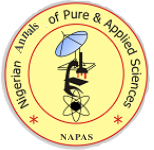Parasitological and Molecular Studies on Co-Infection of Plasmodium falciparum and Schistosoma haematobium Amongst Women in Igede land, Benue State, Nigeria
DOI:
Keywords:
Molecular Studies, Plasmodium falciparum, Schistosoma haematobium, WomenAbstract
This study investigated the co-infection of Plasmodium falciparum and Schistosoma haematobium among women in Igedeland of Benue State, Nigeria using parasitological and molecular approaches. Urine and blood samples were collected from women and processed parasitologically for S. haematobium and P. falciparum respectively. Well-structured questionnaires were used to obtain socio-demographic data from the women. Representative samples were afterward processed molecularly using PCR technology. Data obtained were entered into SPSS and analyzed using the chi-square test to test the relationship between variables and co-infection rates. Results obtained revealed an overall co-infection rate of 1.25% with P. falciparum and S. haematobium recording individual rates of 17.45% and 6.07% respectively. A higher co-infection rate was recorded for women within the age range of 20-30years (1.92%) as well as those who were farmers (2.80%). Those with secondary education recorded (2.29%) while those separated had (13.04%). There was a significant difference in the co-infection rates of women in Igedeland with respect to age, education, and location (P<0.05) while occupation and marital status were not significant (P>0.05). Also, molecular characterization of the parasites revealed the presence of plasmodium (Pf 18S) and S. haematobium (Sh73) DNA markers in women of Igedeland. It was concluded that the co-infection rate is relatively low when compared to reports in times past. Nevertheless, the occurrence of single parasite infection is high with P. falciparum being the most dominant parasite.
Downloads
Published
How to Cite
Issue
Section
License
Copyright (c) 2022 P O Odeh, E A Omudu

This work is licensed under a Creative Commons Attribution-ShareAlike 4.0 International License.



 Contact Us
Contact Us Editorial Team
Editorial Team Join As A Reviewer
Join As A Reviewer  Request For Print Copy
Request For Print Copy


 Cprint Publishers
Cprint Publishers